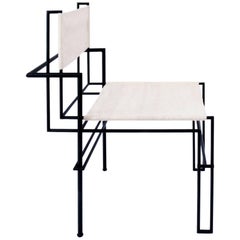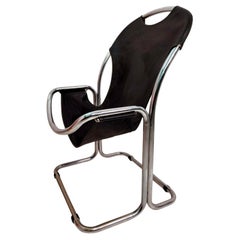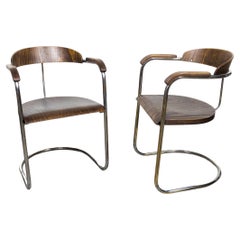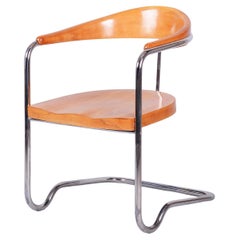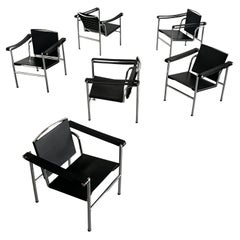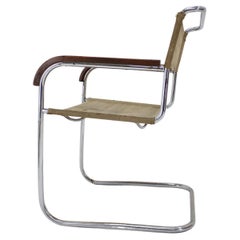Bauhaus Seating
The Bauhaus was a progressive German art and design school founded by the architect Walter Gropius that operated from 1919 to 1933. Authentic Bauhaus furniture — sofas, dining chairs, tables and more — and the school’s followers married industrial and natural materials in simple, geometric forms. The goal of the Bauhaus was to erase the distinction between art and craft while embracing the use of new technologies and materials.
ORIGINS OF BAUHAUS FURNITURE DESIGN
- Art and design school established in Germany in 1919
- Promotion of a union of art, craft and technology
- Design intended for mass production
- School’s workshops focused on cabinetry, metalworking, typography, textiles and more
- Informed by De Stijl, Constructivism, Art Nouveau, Arts and Crafts, and modernism; influenced mid-century modernism, Scandinavian modernism
CHARACTERISTICS OF BAUHAUS FURNITURE DESIGN
- Emphasis on craft
- Simplicity, order, clarity and a prioritization of functionalism
- Incorporation of geometric shapes
- Minimalist and refined, little to no ornamentation
- Use of industrial materials such as tubular chrome, steel and plastic as well as leather, cane and molded plywood in furniture and other products
BAUHAUS FURNITURE DESIGNERS YOU SHOULD KNOW
- László Moholy-Nagy
- Ludwig Mies van der Rohe
- Anni Albers
- Josef Hoffmann
- Marcel Breuer
- Marianne Brandt
AUTHENTIC BAUHAUS FURNITURE ON 1STDIBS
The name Bauhaus is derived from the German verb bauen, “to build.” Under the school’s innovative curriculum, students were taught the fine arts, such as painting and sculpture, as well as practical skills like carpentry and metalworking.
The school moved from Weimar in 1925 to the city of Dessau, where it enjoyed its heyday under Gropius, then Hannes Meyer and Ludwig Mies van der Rohe. The period from 1932 to 1933 when it operated in Berlin under Mies was its final chapter. Despite its brief existence, the Bauhaus has had an enduring impact on art and design in the United States and elsewhere, and is regarded by many as the 20th century’s chief crucible of modernism.
The faculty roster at the Bauhaus reads like a who’s who of modernist creative genius — it included such artists as Paul Klee, Wassily Kandinsky and László Moholy-Nagy along with architects and designers like Mies and Marcel Breuer, who became known for his muscular brutalist-style concrete buildings in the postwar years. In 1925, while he was head of the Bauhaus carpentry workshop, Breuer gave form to his signature innovation: the use of lightweight tubular-steel frames for chairs, side tables and sofas — a technique soon adopted by Mies and others. Breuer’s Cesca chair was the first-ever tubular steel frame chair with a caned seat to be mass produced, while the inspiration for his legendary Wassily chair, a timeless design and part of the collection crafted to furnish the Dessau school, was the bike he rode around campus.
Bauhaus design style reflects the tenets by which these creators worked: simplicity, clarity and function. They disdained superfluous ornament in favor of precise construction. Seating pieces such as side chairs, armchairs or club chairs for example, were made with tubular metal or molded plywood frames, and upholstery was made from leather or cane. Above all, designs in the Bauhaus style offer aesthetic flexibility. They can be the elements of a wholly spare, minimalist space, the quiet foundation of an environment in which color and pattern come from one’s own collection of art and artifacts.
Today, from textiles to typefaces, architecture, furniture and decorative objects for the home, Bauhaus creations continue to have an outsize influence on modern design.
Find a collection of authentic Bauhaus furniture on 1stDibs.
2010s Mexican Bauhaus Seating
Metal
1970s Italian Vintage Bauhaus Seating
Metal
1930s Austrian Vintage Bauhaus Seating
Steel
20th Century Czech Bauhaus Seating
Chrome
1970s Italian Vintage Bauhaus Seating
Steel, Chrome
1930s Czech Vintage Bauhaus Seating
Chrome
2010s Bauhaus Seating
Teak
1990s Italian Bauhaus Seating
Steel, Chrome
1930s German Vintage Bauhaus Seating
Stainless Steel
Mid-20th Century Italian Bauhaus Seating
Steel, Chrome
1930s Czech Vintage Bauhaus Seating
Chrome
1970s Italian Vintage Bauhaus Seating
Chrome, Iron
2010s Danish Bauhaus Seating
Steel
21st Century and Contemporary Italian Bauhaus Seating
Plywood
Early 20th Century Bauhaus Seating
Steel
2010s Italian Bauhaus Seating
Chrome
Early 20th Century Czech Bauhaus Seating
Steel, Chrome
1920s Austrian Vintage Bauhaus Seating
Wood
Mid-20th Century Czech Bauhaus Seating
Canvas, Bentwood
1980s Italian Vintage Bauhaus Seating
Steel, Chrome
Early 20th Century German Bauhaus Seating
Velvet, Beech
Early 20th Century French Bauhaus Seating
Chrome
Late 20th Century Italian Bauhaus Seating
Metal
20th Century Czech Bauhaus Seating
Steel, Chrome
1930s Italian Vintage Bauhaus Seating
Wood
1960s Italian Vintage Bauhaus Seating
Fabric, Rosewood
1920s German Vintage Bauhaus Seating
Chrome
Early 20th Century German Bauhaus Seating
Chrome
Early 20th Century Dutch Bauhaus Seating
Metal, Chrome
1940s German Vintage Bauhaus Seating
Chrome
1930s German Vintage Bauhaus Seating
Upholstery, Wood
1930s European Vintage Bauhaus Seating
Steel
1970s Italian Vintage Bauhaus Seating
Chrome
1930s Italian Vintage Bauhaus Seating
Wood
1970s Italian Vintage Bauhaus Seating
Chrome
Early 20th Century German Bauhaus Seating
Wicker, Beech
Early 20th Century Austrian Bauhaus Seating
Steel, Chrome
20th Century European Bauhaus Seating
Chrome
1930s German Vintage Bauhaus Seating
Papercord, Teak
Mid-20th Century Italian Bauhaus Seating
Chrome
Mid-20th Century Italian Bauhaus Seating
Steel, Chrome
21st Century and Contemporary Italian Bauhaus Seating
Plywood
1930s Italian Vintage Bauhaus Seating
Metal
Early 20th Century Italian Bauhaus Seating
Metal
1920s German Vintage Bauhaus Seating
Chrome
1950s American Vintage Bauhaus Seating
Fabric, Bentwood
1950s German Vintage Bauhaus Seating
Chrome
Early 20th Century Unknown Bauhaus Seating
Chrome
1930s Czech Vintage Bauhaus Seating
Metal, Steel, Chrome
1970s Vintage Bauhaus Seating
Chrome
1920s Czech Vintage Bauhaus Seating
Bentwood
Mid-20th Century European Bauhaus Seating
Steel
Early 20th Century Czech Bauhaus Seating
Chrome, Steel
1930s German Vintage Bauhaus Seating
Steel
20th Century Czech Bauhaus Seating
Steel, Chrome
1920s Austrian Vintage Bauhaus Seating
Rattan, Birch
1930s Polish Vintage Bauhaus Seating
Aluminum
1970s Austrian Vintage Bauhaus Seating
Chrome
2010s American Bauhaus Seating
Steel, Chrome
1960s German Vintage Bauhaus Seating
Steel
